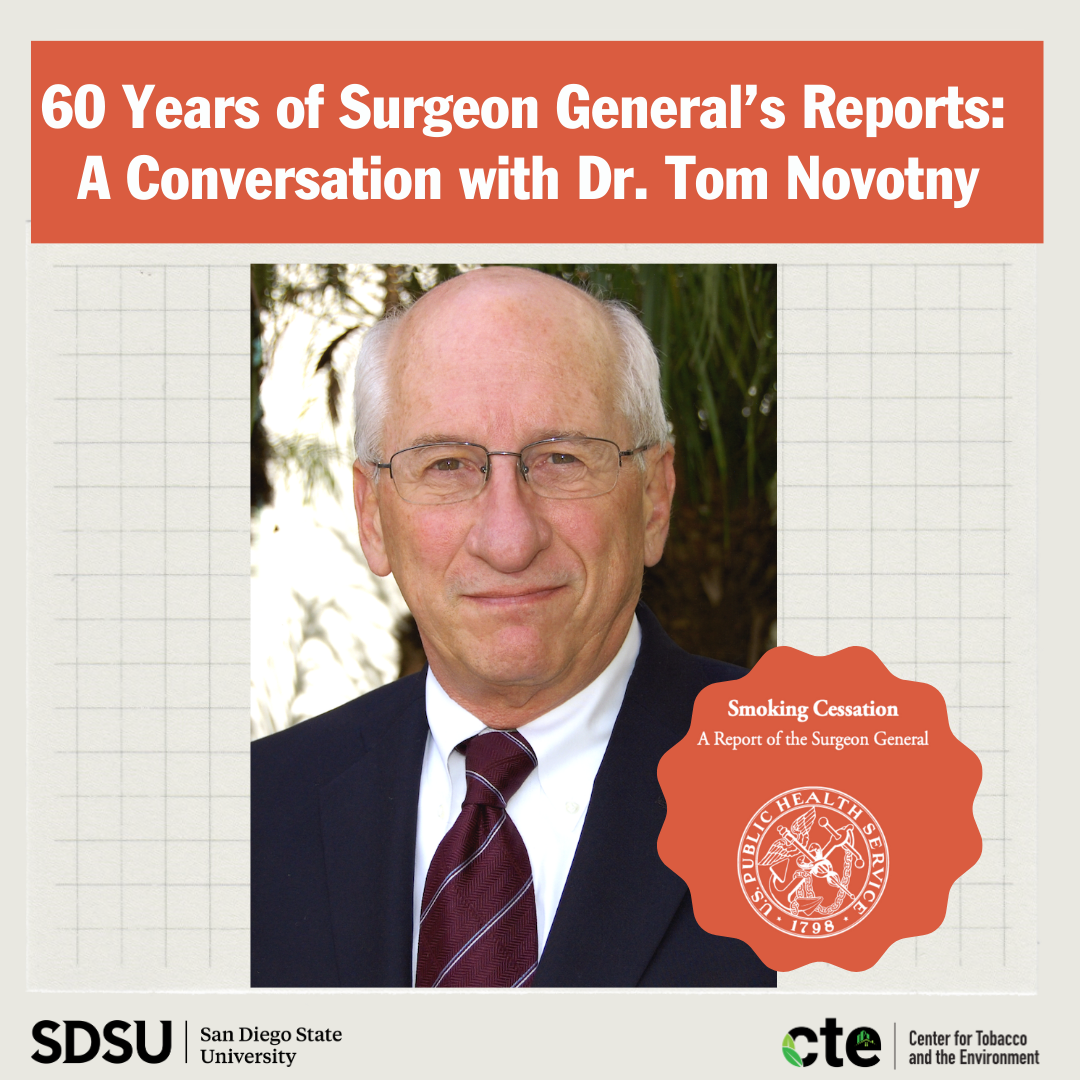
SDSU’s Policy Research Center for Tobacco and the Environment (CTE) is hosting its first annual Symposium on May 31, World No Tobacco Day, from 11:30 a.m. – 3:00 p.m. at the College-Rolando Library Community Room.
In honor of this day and this year marking the 60th anniversary of the release of the first report of the U.S. Surgeon General’s Advisory Committee on Smoking and Health, the Center for Tobacco and the Environment interviewed San Diego State University Professor Emeritus Tom Novotny about his experiences working on Surgeon General’s Reports and in public health.
***
CTE: What is the main purpose of the Surgeon General’s Report on smoking and health?
TN: The Surgeon General’s Report on smoking and health is required by law to be produced regularly as one of the more important, balanced reviews of the scientific information about the single most important preventable cause of illness in this country: tobacco use.
The most important Surgeon General Report ever was the 1964 report, which stated officially that cigarettes, when used as directed, will likely kill you. That Report and the efforts that followed can be cited as a turning point in the fight against tobacco-caused diseases.
CTE: How many Surgeon General’s Reports did you work on, and what was your role with them?
TN: I was a senior editor for two, a managing editor for two, a contributor to probably six, and a reviewer of at least that many. In 1987, I joined the Office on Smoking and Health under the Surgeon General, and then I worked on tobacco issues through most of my career with the CDC.
CTE: How have Surgeon General’s Reports changed over time?
TN: Now the Reports try to segment out different parts of the tobacco epidemic in order to focus attention on specific remedies and policies. For instance, some Reports have addressed smoking among the young, minorities and women. Other Reports have also addressed secondhand smoke, e-cigarettes and smokeless tobacco.
CTE: How do you predict they will continue to advance?
TN: I’ve had discussions with the Office on Smoking and Health, and I think they may be interested in a Report on the environmental impacts of tobacco as well as continued focus on vulnerable populations.
CTE: What was your favorite part of working on the Surgeon General’s Reports?
TN: My favorite part was seeing them finished because it is such an intense, credible piece of work. At the same time, I got to know a lot of really great scientists and government health professionals.
CTE: Why did you get into public health in the first place?
TN: My first MD job was as a small-town family doctor in Northern California. I had completed the Family Practice Residency program in Santa Rosa, and an administrator of the program asked me to be her doctor because she had been coughing. I did a chest x-ray, and she had this huge lung tumor. She had been smoking since she was 12 or 13 years old. This was a terminal diagnosis for her, as we had so few therapeutics back then.
As a doctor, you’re at the tail end of a lot of disease risks and things that happen in people’s lives. In order to actually get upstream from those risks, public health seemed like a more reasonable pursuit for me.
CTE: What is one of your proudest moments in your career?
TN: I managed to arrange one of my CDC jobs to be assigned to the University of California, Berkeley School of Public Health, and I got a bit of money from the Office on Smoking and Health to try to figure out what the economic costs of tobacco use were to the health care system. In 1994, we published the results of that study in an article in the CDC’s Morbidity and Mortality Weekly Report.
After the press covered the publication, I was called by a lawyer in Mississippi named Richard Scruggs. Over three days in Berkeley, we explained to Scruggs how we came up with these estimates. He went back to Mississippi and then recruited several state attorneys general who came together to sue the tobacco industry on behalf of the state attorneys general to recover the cost of medical care.
It resulted in the Master Settlement Agreement. This settlement paid out billions of dollars from the major tobacco companies to all of the states. It also set up an NGO (the American Legacy Foundation), now called the Truth Initiative, in Washington, DC, and it endowed the UC San Francisco Library of Truth Tobacco Industry Documents. That study was probably the most important thing I’ve done in my life.
CTE: What do you want people to know about tobacco and tobacco product waste?
TN: We need to continue to focus on preventing tobacco use because people are still dying in massive numbers. Now we know more about the environmental side of it, and I think it’s important to emphasize that filters are single-use plastics that have no health benefits. We’re way behind on taking effective action, which would mean banning the sale of filtered cigarettes. By doing so, I think people will smoke fewer cigarettes, might not be as likely to start smoking, and might be encouraged to quit.
This interview has been edited for clarity and length. You can read the full interview here.